

Digital Citizen – thinking about Facebook, Friends and Teachers. Facebook is amazing.
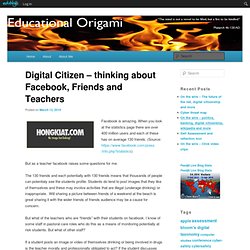
When you look at the statistics page there are over 400 million users and each of these has on average 130 friends. (Source: But as a teacher facebook raises some questions for me. The 130 friends and each potentially with 130 friends means that thousands of people can potentialy see the students profile. Making Progress. Quick Facts. Www.childrensmercy.org/Content/uploadedFiles/Departments/Press_Room/CMH Healthy Perspectives Parents Kids and Social Media FINAL 08.10.2012.pdf. Bad Online Behavior Jeopardizes Students' College Plans. Students as Learning Designers: Using Social Media to Scaffold the Experience « Focus on Adult Learning . . . Innovation through Inquiry. By Leanne Cameron & Miriam Tanti The ‘students as learning designers’ approach challenges transmission models of pedagogy and requires teachers to relinquish some control to their students so that they might have the space to experiment and discover how to learn.
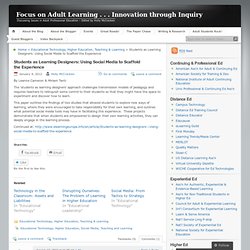
This paper outlines the findings of two studies that allowed students to explore new ways of learning, where they were encouraged to take responsibility for their own learning, and outlines what potential social media tools may have in facilitating this experience. These projects demonstrate that when students are empowered to design their own learning activities, they can deeply engage in the learning process.
Students as learning designers: Using social media to scaffold the experience. Bad Online Behavior Jeopardizes Students’ College Plans « Focus on Adult Learning . . . Innovation through Inquiry. By Robin L.
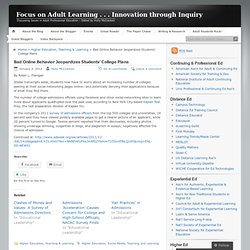
Flanigan Stellar transcripts aside, students now have to worry about an increasing number of colleges peering at their social-networking pages online—and potentially denying their applications because of what they find there. The number of college-admissions officials using Facebook and other social-networking sites to learn more about applicants quadrupled over the past year, according to New York City-based Kaplan Test Prep, the test preparation division of Kaplan Inc. In the company’s 2011 survey of admissions officers from the top 500 colleges and universities, 24 percent said they have viewed publicly available pages to get a clearer picture of an applicant, while 20 percent turned to Google.
Twelve percent reported that their discoveries, including photos showing underage drinking, vulgarities in blogs, and plagiarism in essays, negatively affected the chance of admission. School Administrators Seen to Embrace New Digital Devices. Teens 2012: Truth, Trends, and Myths About Teen Online Behavior. Digital Citizenship: Boy, Are We Bad at This... Let’s be honest: In the area of digital citizenship, as educators, we are not doing our jobs.
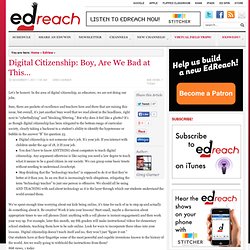
Sure, there are pockets of excellence and teachers here and there that are raising this issue, but overall, it’s just another buzz word that we read about in the headlines, right next to “cyberbullying” and “blocking/filtering.” But why does it feel like a ghetto? It’s as though digital citizenship has been relegated to the bottom rungs of curricular society, clearly taking a backseat to a student’s ability to identify the hypotenuse or bubble in the answer “B” for question 23. Digital citizenship is not someone else’s job. It’s your job. We’ve spent enough time worrying about our kids being online, it’s time for each of us to step up and actually do something about it. Our students have at their fingertips some of the most powerful and capable inventions known to the history of the world. 868 views, 1 today What do you think?
How Should Schools and Parents Be Involved in Kids’ Online Lives? Culture Flickr:Demos Helsinki By Matt Levinson Parents are constantly grappling with how to deal with online privacy issues with their kids.
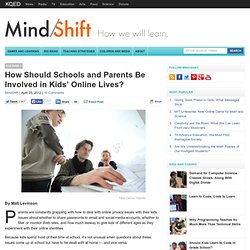
Issues about whether to share passwords to email and social media accounts, whether to filter or monitor Web sites, and how much leeway to give kids of different ages as they experiment with their online identities. Because kids spend most of their time at school, it’s not unusual when questions about these issues come up at school but have to be dealt with at home — and vice versa. A recent example presented itself when a parent discovered that her middle-school-age daughter was interested in a social network site called Zorpia, which bills itself as a site to “share unlimited photos, post journals and make friends.” But after reading a review of the site, the mother was concerned about whether it was too risky to allow her daughter to interact with strangers online. Bottom line: Kids are curious. 'Engage, don't restrict': Digital parenting study.
Schools can’t stop wondering what students do on Facebook. It's graduation season, which means that students, teachers, and administrators alike are all thinking about one thing: Facebook.
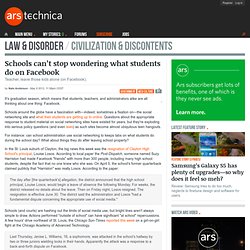
Schools around the globe have a fascination with—indeed, sometimes a fixation on—the social networking site and what their students are getting up to online. Questions about the appropriate response to student material on social networking sites have existed for years, but they're exploding into serious policy questions (and even laws) as such sites become almost ubiquitous teen hangouts.